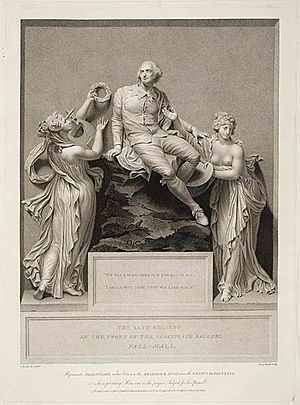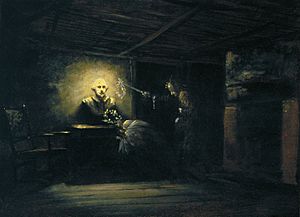Bardolatry facts for kids

Bardolatry is a word that means having too much admiration for William Shakespeare. People have called Shakespeare "the Bard" since the 1700s. Someone who loves Shakespeare a lot, almost like a fan, is called a bardolator.
The word bardolatry comes from Shakespeare's nickname "the Bard of Avon." It also uses the Greek word latria, which means "worship" (like in idolatry, which is worshipping idols). The writer George Bernard Shaw created this word in 1901. Shaw said he didn't like Shakespeare as a deep thinker. He felt Shakespeare didn't write about social problems, unlike Shaw's own plays.
Contents
How Bardolatry Started
People started admiring Shakespeare a lot even when he was alive. In an old play called The Return from Parnassus, someone who loves poetry says they want a picture of Shakespeare. They say they will "worship sweet Mr Shakespeare." They even want to sleep with his poem Venus and Adonis under their pillow. But the play actually makes fun of this character for liking fun stories more than serious ones.
The serious idea of bardolatry began in the mid-1700s. A famous writer named Samuel Johnson said Shakespeare's work was like "a map of life." In 1769, the actor David Garrick showed a statue of Shakespeare in Stratford-upon-Avon. He read a poem that ended with " 'tis he, 'tis he, / The God of our idolatry." Garrick even built a special temple for Shakespeare at his house! This strong admiration grew during the Romantic era. Writers like Samuel Taylor Coleridge and John Keats called Shakespeare a truly amazing genius. George Bernard Shaw's dislike of this idea was actually predicted by William Cowper. Cowper wrote a poem in 1785 that called Garrick's festival disrespectful.
Voltaire's Role
Voltaire, a famous French writer, visited England in 1726. He went to the Theatre Royal, Drury Lane many times and watched several of Shakespeare's plays. He thought Shakespeare was a brilliant writer. Voltaire was the main person who helped spread Shakespeare's works in France. He even translated the first three acts of Julius Caesar into French. By promoting and translating Shakespeare, Voltaire helped start the huge admiration for him.
Later, Voltaire tried to fight against this strong admiration. He called Shakespeare a "barbarian" and said the admiration was "simply bardolatry." He also criticized Shakespeare for not following the rules of art. But by then, the idea of loving Shakespeare so much had already spread widely.
Victorian Era Admiration

Bardolatry became very important in the Victorian era. Many writers at that time treated Shakespeare's plays like they were as important as the Bible. In 1840, the writer Thomas Carlyle said, "This King Shakespeare... does not he shine... as the noblest... of rallying signs; indestructible." He meant Shakespeare was a powerful and lasting symbol for everyone.
The main idea of bardolatry is that Shakespeare is not just the best writer ever. People also see him as the smartest person, the best at understanding how people think, and the most truthful in showing human life. In short, bardolatry means Shakespeare knows everything about human experience and can explain it perfectly.
Carlyle explained it like this:
Perhaps the idea that Shakespeare is the best poet and greatest mind in literature is actually true. I don't know anyone else with such a clear way of seeing things or such deep thoughts. Everything in his great mind is so true and clear, like a calm, deep sea!
Shaw's doubts about Shakespeare came from these strong ideas. Shaw wanted to show that Shakespeare was just a human, not a god. He pointed out that Shakespeare could write amazing things, but also some boring parts. He even made a funny puppet play called Shakes versus Shav where he compared Shakespeare's work to his own.
Shaw clearly said that Shakespeare was a great poet, even calling him "a very great author." He praised Shakespeare's beautiful use of language, which Shaw called "word-music." He also said, "Nobody will ever write a better tragedy than Lear." However, Shaw also wrote in a letter, "Oh, what a damned fool Shakespeare was!" He complained about Shakespeare's "huge, fancy speeches," his "boring common sayings," and his way of mixing simple thoughts with "no real ideas."
Harold Bloom's View
The critic Harold Bloom brought back the idea of bardolatry in his 1998 book, Shakespeare: The Invention of the Human. In his book, Bloom looks at each of Shakespeare's 38 plays. He says that 24 of them are masterpieces. Bloom wrote this book to help regular readers and theatergoers. He argues that bardolatry "should be even more a secular religion than it already is."
Bloom believes that Shakespeare "invented" what it means to be human. He thinks Shakespeare showed us how we "overhear" ourselves, meaning we listen to our own thoughts. This helps us grow and understand ourselves better. Bloom also believes that Shakespeare's characters are like "real people." He says they have changed how not only readers, but most people in Western cultures, think and see the world.
See also
- Shakespeare's reputation
 | Aurelia Browder |
 | Nannie Helen Burroughs |
 | Michelle Alexander |

